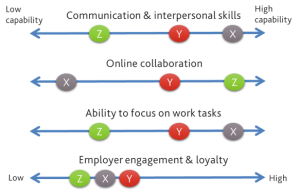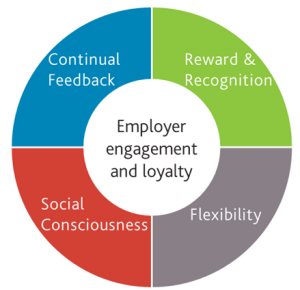Generation Z
Generation Z – Are you ready for the arrival of the digital natives?
You know them, those bright young people who simultaneously hold a mobile phone and surf an iPad whilst playing video games? Known as Generation Z (those born between 1995 and 2010), these digital natives are soon coming to a workplace near you. You may not realise it, but 2016 sees the dawn of a new workforce, as significant numbers of Generation Z graduate and start their search for work.
With the economic situation ensuring people work for longer than ever, this will herald the start of four different generations co-existing in the workplace. Whether this is a happy co-existence is yet to be seen but far-sighted employers have their views set on understanding Generation Z and reviewing their readiness to engage with this group.
Louise Meikle, Head of Human Resources for Slaughter and May explains:
“We recognise the changing aspirations of today’s (and as importantly tomorrow’s) emerging talent in seeking fulfilling and engaging work, with opportunities to develop at pace. We are actively reviewing our recruitment, development and retention strategies so we continue to be an attractive employer of choice.”
 Generation Z comprises nearly 2 billion people and within a decade will represent 20% of the global workforce2. Many believe this change will give rise to some of the greatest challenges for employers in how they successfully integrate these smart, technologically intuitive employees with three other generations: Baby Boomers (born 1946 to the mid-1960s), Generation X (born 1965 to the early 1980s) and Generation Y (born 1982 to mid-1990s). Indeed, a survey in the US found that 65% of workers said that generational gaps were already making the job difficult3. This will require different human resource strategies and yet the profession appears to be relatively underprepared. So, with little research data available about Generation Z, how do their preferences differ from those of other generations and what will this mean for managers and HR professionals?
Generation Z comprises nearly 2 billion people and within a decade will represent 20% of the global workforce2. Many believe this change will give rise to some of the greatest challenges for employers in how they successfully integrate these smart, technologically intuitive employees with three other generations: Baby Boomers (born 1946 to the mid-1960s), Generation X (born 1965 to the early 1980s) and Generation Y (born 1982 to mid-1990s). Indeed, a survey in the US found that 65% of workers said that generational gaps were already making the job difficult3. This will require different human resource strategies and yet the profession appears to be relatively underprepared. So, with little research data available about Generation Z, how do their preferences differ from those of other generations and what will this mean for managers and HR professionals?
Communication and interpersonal skills
Growing up with technology and social media at the centre of their social world, Generation Z has a breadth of networks envied by other generations. However, what started with Generation Y’s preference for text messaging and emojis, has developed in Generation Z into a reliance on technology which has changed the concept of social interaction at the expense of face-to-face communication and interpersonal skills. This places an unprecedented onus on Learning & Development departments and managers as mentors, to develop those skills to help Generation Z orally communicate and resolve potential conflicts.
Online collaboration
On the other hand, Generation Z’s ability to connect with others via technology could yield significant benefits. Globalisation has led to an increasing reliance on virtual teams, where Generation Z’s creativity in collaborating will be a crucial advantage. Management capabilities and attitudes may need readjusting to fully benefit from this collaboration. Generation X managers are likely to require encouragement to view this preference for “virtual” collaboration as an opportunity for innovation rather than a challenge to their control. Managers will also need to build high performing teams of multi-experienced generations and productively balance their differing aspirations. This will require them to truly embrace diversity and flex to bring out the best in very different individuals.
Task delivery
Generation Z grew up moving from technology to technology, averaging between five screens at any time. As a result, they show unparalleled multi-tasking, quickly processing large amounts of information. This has led to shorter attention spans4 (think Snapchat and Instagram) and a quest for quick answers, over a capacity to think critically and accurately solve problems.
Managers will be challenged to find ways to ensure a focused approach to delivery and to keep grasshopper minds actively engaged.
Professional freelancers
Generation Y showed they were impatient for rapid career progression and saw their parent’s ‘organisational loyalty’ as not being rewarded. Expectations are that Generation Z will take a greater professional ‘freelancer’ approach to their careers – forecasts by social researcher Mark McCrindle expect them to average 17 jobs in a lifetime.2 This has significant consequences for onboarding and engagement strategies, as well as impacting the way in which work is delivered if Generation Z are to be developed and kept interested at the rate they want.
Self development
Easy access to information feeds a desire by Generation Z to learn. A 70:20:10 development model might play to their craving to gain knowledge through interesting and rewarding work. A penchant for visual, snappy communication means that modular, technology-led training will be in demand over more traditional approaches. This may be a business challenge, as only 25% of HR professionals working with Generation Y rate themselves as ‘highly effective at enabling a strong self-learning culture’5.
Engagement and loyalty
Generation Z’s aspirations when compared to previous generations may in time be unfairly judged as ‘decreased loyalty’. Their work ethic will ensure they get the job done – just in a different way. What is clear is that relations with this generation require a fundamental change in the rules of engagement. Organisations’ focus will need to change from retention to ‘renewable loyalty’ or intermittent interaction with a fluid talent pool. Traditional people performance measures, such as retention and satisfaction, will make way for output metrics such as delivery, impact and value creation.
 Employer loyalty and engagement is a multi-faceted issue with Generation Z’s preferences raising issues around how feedback is given, performance is recognised, workplace flexibility and how social justice is provided.
Employer loyalty and engagement is a multi-faceted issue with Generation Z’s preferences raising issues around how feedback is given, performance is recognised, workplace flexibility and how social justice is provided.
Joanne Hannant, Head of Resourcing and HR Services at Virgin Money, said: “Indications are that Generation Z will engage with us quite differently. It is therefore imperative we develop effective ways of managing them to provide the feedback, mentoring and hands-on experience in a way that enhances their value to the organisation.”
Continual feedback
The ability to immediately source information and solicit feedback from social media has contributed to Generation Z’s demand for constant feedback and affirmation. This need is likely to drive a move away from set timeframes for performance management. Leaders will need to coach, and to be good at it if they are to give Generation Z the regular, honest feedback and spontaneous recognition they yearn for.
Duncan Symonds, Head of Infrastructure at WSP said: “If our managers are to really connect with their Generation Z reports, they will have to adjust their approach to feedback. There now is much more emphasis on balancing the formal feedback process with an ongoing more casual ‘conversation’. This requires managers to have a more developed informal coaching and mentoring capability as part of their skill set.”
Reward and recognition
Career motivations and aspirations are different as well – less motivated by financial reward but keen to take part in interesting work which gives rise to an array of development prospects. Peer recognition and visibility of their impact from leaders will be vital.
Companies will need to create more tailored recognition and reward structures which confirm the value and impact of the individual’s work. Reliance on monetary rewards will need to be broadened to recognise performance in a variety of ways such as giving visibility to senior leaders, social recognition, interesting projects, chances to broaden skills and faster career progression.
Flexibility
Generation Y started blurring the distinction between work and personal lives but Generation Z will enter work expecting flexibility and autonomy in work hours and location, simply because they know no other way. A can-do mentality means they will get the job done whenever and wherever they are, whether in a coffee bar or within traditional office hours.
Organisations will require a clearer view on their future talent requirements, with specialist knowledge at the heart of this. In the meantime, recruitment and retention needs to cater for a more fluid, intermittent talent pool in order to tap into Generation Z’s freelancing approach. Successful organisations will build strong alumni networks enabling Generation Z to dip into and out of projects to build expertise.
Social consciousness
Research says Generation Z are more inspired by social justice than any generation before, with 60% wanting jobs with a social impact, compared to just 39% of Generation Y6. To engage with this socially conscious group, leaders will need to be clear on how their values and culture deliver this social change. Individuals will want to know how they contribute to the organisational vision and how companies cater to social need.
So, are you ready to interact with these digital natives or are you still busy assimilating Generation Y? Take a look at our seven point checklist to see how ready your organisation is to engage with Generation Z.
Assessing organisational readiness
- Are your future talent needs understood? What capabilities will ensure you thrive and maintain competitive advantage?
- Are your sourcing strategies adept at quickly identifying and accessing appropriate talent pools and redeploying people?
- Is there a systematic approach to rapidly and effectively onboard new hires?
- How skilled are your managers at coaching, promoting inclusivity and does your performance culture promote regular performance ‘check-ins’ and peer recognition?
- Do your career paths encourage the mobility of talent around the organisation by providing opportunities for new roles and experiences?
- Do your reward systems provide a range of blended options besides monetary rewards?
- How appropriate are your training strategies at encouraging self-directed learning and supporting the right types of skills development such as interpersonal communication and resilience?
References:
- Lynda Gratton – The Future of Work/Generations at Work, Helsinki
- McCrindle – Attracting and Retaining Generation Z
- David Stillman of Bridgeworks
- National Centre for Biotechnology Information
- Just the Facts about Millennials – Bersin & Associates
- Honey & Sparks
For more information please contact: Mike Vessey

